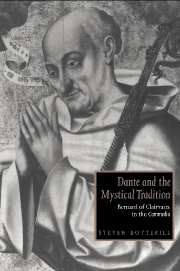Book contents
- Frontmatter
- Contents
- Acknowledgements
- 1 (Re-)reading Dante: an unscientific preface
- PART I READING
- PART II RE-READING
- 4 Bernard in the Trecento commentaries on the Commedia
- 5 Dante, Bernard, and the Virgin Mary
- 6 From deificari to trasumanar? Dante's Paradiso and Bernard's De diligendo Deo
- 7 Eloquence – and its limits
- Bibliography
- Index
- CAMBRIDGE STUDIES IN MEDIEVAL LITERATURE
4 - Bernard in the Trecento commentaries on the Commedia
Published online by Cambridge University Press: 15 January 2010
- Frontmatter
- Contents
- Acknowledgements
- 1 (Re-)reading Dante: an unscientific preface
- PART I READING
- PART II RE-READING
- 4 Bernard in the Trecento commentaries on the Commedia
- 5 Dante, Bernard, and the Virgin Mary
- 6 From deificari to trasumanar? Dante's Paradiso and Bernard's De diligendo Deo
- 7 Eloquence – and its limits
- Bibliography
- Index
- CAMBRIDGE STUDIES IN MEDIEVAL LITERATURE
Summary
A number of ‘invidïosi veri’ (Par., X. 138) confront anyone who tries to use study of the Trecento commentaries as a means towards fuller understanding of Dante's Commedia – let alone as the principal, or even exclusive, guide to what is taken, at so vast a remove of time, to be the poem's authentic cultural context. The most immediate of these is the unsatisfactory state of the relevant material: several important commentaries and sets of glosses still exist only in manuscript (and are thus, sadly but understandably, all too often neglected by scholars who lack the time and resources needed to study them in silu), while some of those that have been published are available only in (mainly nineteenth-century) editions whose disastrously unreliable texts are a standing reproach to philological scholarship.
Another potential difficulty – though this should perhaps be seen as a source less of frustration than of interest, even excitement – is the fact that the various commentaries steadfastly refuse to be forced or cajoled by critics into speaking with one voice, or into providing, for the hurried modern reader's convenience, a single, homogenized reading that can safely be treated as the ‘official’ Trecento view and, very likely, be disregarded thereafter. Quite the contrary, in fact: the commentaries' interpretations of detail are as disparate as their methods of analysis, and their conceptions of even the most basic theoretical issues – the disputed primacy of literal or allegorical reading, the Commedia's status as truth-telling vision or poetical fiction, the technical employment of the accessus ad auctores or the quadruplex sensus – vary to an alarming, or exhilarating, degree.
- Type
- Chapter
- Information
- Dante and the Mystical TraditionBernard of Clairvaux in the Commedia, pp. 119 - 147Publisher: Cambridge University PressPrint publication year: 1994



